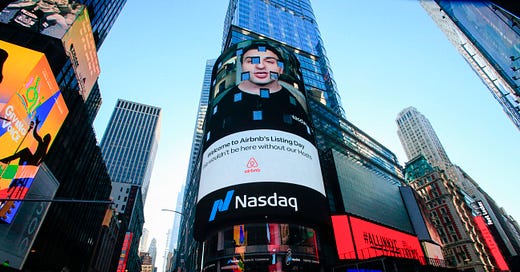Airbnb’s Ex-CFO on Airbnb’s IPO
Laurence Tosi reflects on Airbnb, DoorDash, and the financial markets.
The big question everyone is asking this week is, what do you make of the market’s rapturous reception to Airbnb and DoorDash’s public offerings? So, I reached out to an authority on the markets – and Airbnb, Laurence Tosi.
LT, as he’s known, was the chief financial officer at Blackstone before taking the CFO job at Airbnb in 2015. He left the home sharing company in February 2018. Tosi wanted Airbnb to go public back then. Airbnb CEO Brian Chesky did not.
These days, Tosi runs a growth equity investment firm called WestCap Group. The firm has over $2 billion in assets under management. And this week, his old employer decided to finally take the plunge and go public. Airbnb raised $3.5 billion in its initial public offering. Chesky processed the news on live TV that his company’s stock price was poised to double when it opened for trading Thursday. Airbnb’s market cap soared above $100 billion. The company’s market capitalization stood at $83 billion Friday.
Tosi, who is notoriously press shy, is bullish on Airbnb. “I always thought Airbnb would be the first $100 billion travel company. I just didn't think it would happen in the pandemic,” the former CFO told me in a phone interview Friday. “The reason you're seeing what you're seeing is, it's the best business model of these gig economy companies. Its possibilities are almost limitless for how big it can be.”
He’s not feeling as optimistic about the broader financial landscape. “The market is pricing a perfect recovery from a pandemic – not just in Airbnb, but in everything,” he said.
Tosi doesn’t think the recovery will be so easy. “There are a lot of things that will not be repaired when the pandemic goes away. There's a lot of underlying damage. Think about the people sitting at home who have lost their company, lost their job and they're like what the hell are these people doing? It's terrible. It's tragic. The fundamental damage to the economy is not going to turn around.”
Yet, he thinks Airbnb can sustain its lofty public market valuation. He said the company has indicated that it could generate $5 billion in revenue next year and he believes it.
I offered my standard criticism of Airbnb: The company has never really figured out anything new. Airbnb’s prospectus features the word “experiences” 250 times, but these host-driven activities represent a miniscule business today. People loved Airbnb for its core marketplace business model when it raised its earliest rounds of funding and that’s why they’re investing in it today many years later. Airbnb hasn’t shown that it has another trick up its sleeve.
Tosi replied, “I agree with everything you said.” But he argued, “That core business is almost limitless. There’s like a billion homes in the world and these guys have 5.6 million active listings.” He thinks that if the company can get the listings on the platform, the customers are there to embrace it.
I confronted him about the fact that he was inherently talking up his own book. After all, he is sitting on a bunch of Airbnb shares from his time as an executive.
He insisted that he was giving it to me straight. “I would never do that,” he said. “I am 100% not talking my own book.”
I obviously think his opinion is worth hearing and think that you are smart enough to take Tosi’s analysis with an asterisk.
Tosi is much less excited about DoorDash. Right now, investors are betting on Airbnb despite the fact that its business has been hurt by the pandemic. But DoorDash’s business has clearly benefited from the lockdown. Tosi said, “I think the one that could be mispriced here is DoorDash, not Airbnb.”
Here’s his math: Airbnb did $4.8 billion in revenue in 2019. DoorDash did $885 million. Airbnb’s revenue is on pace to be $3.36 billion based on the first 9 months of 2020 disclosed in the S-1. DoorDash is on track to generate $2.6 billion. “That's a bubble,” Tosi says about DoorDash’s 2020 revenue. “That's a tremendous amount of growth to come out so quickly.” Airbnb’s market capitalization today is $83 billion. DoorDash’s market cap is $55.6 billion. “If Airbnb is trading at 20-times last year’s revenues and DoorDash is trading 20-times this year’s revenues – Airbnb has tailwinds coming out of the recovery and it might be that DoorDash has headwinds as it comes out of the recovery,” Tosi said. In other words, investors are assuming that Airbnb will grow from a base of pre-pandemic activity and DoorDash will grow from a base of pandemic-level activity. The question is how much DoorDash holds on to its pandemic growth spurt.
I complained that we were only talking about the top-line, itself an indicator that we’ve entered the world of bubblicious thinking. Well, neither of the companies turns a profit, he said. But longer term their earnings profiles are dramatically different. “Airbnb, for sure, is a 35-40% margin business at scale. That's like the best tech companies. DoorDash is going to have margins like Lyft and Uber. I think those are grocery store margins – best year ever a 10 or a 12%.”
I offered my best case for DoorDash relative to Airbnb: DoorDash’s CEO Tony Xu has proven he can out-operate in a tough business. Food is to DoorDash what books are to Amazon, I said.
Tosi took that point in stride, “I do tip my hat to Tony,” Tosi said. “He was a killer operator. He was neck and neck with a bunch of other people – that is pure operational excellence.”
Still, he’s not betting on DoorDash. “What a great pair trade,” Tosi said. “Long Airbnb, short DoorDash.”





